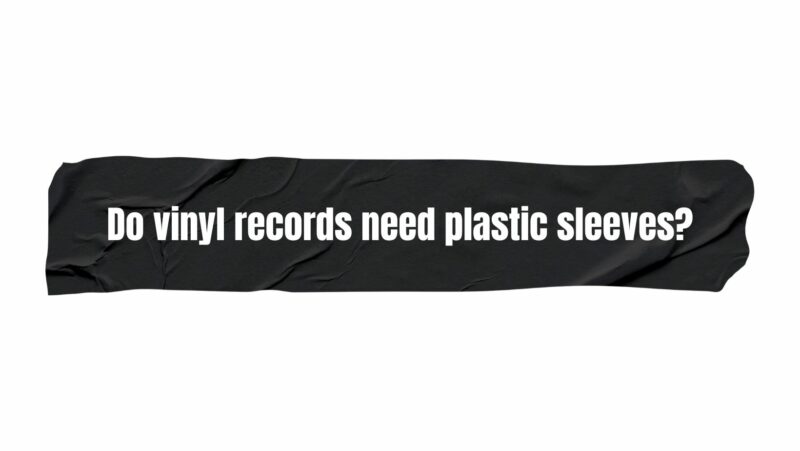Vinyl records are more than just a medium for playing music; they are tangible pieces of history, cultural artifacts, and expressions of artistic creativity. The question of whether vinyl records need plastic sleeves goes beyond the realm of convenience—it delves into the preservation, protection, and longevity of these cherished musical treasures. Plastic sleeves, often referred to as outer sleeves, have become an essential accessory for vinyl enthusiasts and collectors alike. In this article, we will explore the significance of plastic sleeves for vinyl records, examining their role in safeguarding against wear, protecting artwork, preventing deterioration, enhancing value, and ultimately, ensuring the enduring legacy of vinyl.
Preservation Against Wear and Tear
One of the primary purposes of plastic sleeves is to provide a layer of protection against the wear and tear that vinyl records can experience over time:
- Shield from Dust and Dirt: Plastic sleeves act as a barrier against dust, dirt, and other particles that can settle on the record’s surface. This protection minimizes the risk of scratches and damage during handling.
- Prevent Surface Abrasion: Sliding records in and out of their original cardboard sleeves or jackets can lead to friction and abrasion. Plastic sleeves mitigate this friction, reducing the potential for surface abrasion and scratches.
Protecting Artwork and Album Covers
Vinyl records are not just about the music; they are also about visual artistry and storytelling. Plastic sleeves play a crucial role in preserving the artwork and historical context of album covers:
- Artwork Preservation: Plastic sleeves prevent album covers from fading, creasing, or becoming damaged due to exposure to light, dust, and moisture. This ensures that the visual integrity of the album cover remains intact.
- Historical Context: Album covers often provide valuable historical context, capturing the spirit of the era in which the music was released. By protecting album covers, plastic sleeves help preserve this cultural and artistic significance.
Preventing Deterioration
Vinyl records are susceptible to deterioration caused by environmental factors, and plastic sleeves offer a shield against these issues:
- Moisture and Humidity: Exposure to moisture and humidity can cause warping, mold growth, and damage to the record’s surface. Plastic sleeves create a protective barrier that prevents moisture from reaching the record.
- Temperature Fluctuations: Extreme temperature changes can cause records to expand and contract, leading to warping and degradation. Plastic sleeves help regulate temperature changes and prevent rapid shifts.
Enhancing Value and Collectibility
For collectors, the condition of a vinyl record significantly impacts its value. Plastic sleeves contribute to the overall condition and desirability of a record:
- Maintaining Mint Condition: Plastic sleeves maintain the “mint” condition of records by preventing scratches, scuffs, and other signs of wear that can downgrade a record’s grade.
- Collectible Value: For rare and collectible records, the presence of a well-maintained original plastic sleeve can increase the record’s value. Collectors often appreciate the completeness and care exhibited by records with intact sleeves.
Alternative Sleeve Types
While plastic sleeves offer notable benefits, there are other types of sleeves to consider for different preservation needs:
- Anti-Static Sleeves: These sleeves are designed to reduce static buildup on the record’s surface, minimizing the attraction of dust and particles.
- Inner Sleeves: Inner sleeves protect the vinyl itself from scratches and dust. Combining outer and inner sleeves provides comprehensive protection.
Choosing the Right Plastic Sleeves
Selecting the right plastic sleeves is essential for optimal preservation and protection:
- Quality Material: Choose sleeves made from high-quality, archival-safe materials that are free from acids and PVC. These materials ensure that the sleeves do not cause chemical reactions that can damage the records.
- Proper Fit: Ensure that the sleeves are the appropriate size for your records. Sleeves that are too loose or too tight can lead to problems during insertion and retrieval.
Conclusion
The question of whether vinyl records need plastic sleeves is answered with a resounding affirmation of their significance. Plastic sleeves play a vital role in preserving vinyl records for future generations, safeguarding against wear, protecting visual artistry, preventing deterioration, and enhancing the value and collectibility of records. Whether you’re an avid collector or a passionate vinyl enthusiast, the investment in high-quality plastic sleeves is an investment in the longevity and legacy of your cherished vinyl collection.
Each vinyl record tells a story—a story of musical discovery, cultural significance, and artistic expression. By enveloping your records in the protective embrace of plastic sleeves, you ensure that these stories continue to resonate through time, offering a connection to the past, a celebration of the present, and a bridge to the future.


